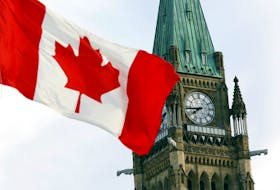Defence Minister Harjit Sajjan has the power to release details of a child molester’s 1980 court martial, but has instead turned over responsibility to review if that should be done to the same officials who refused to make the information public.
The Department of National Defence has taken unprecedented measures to block information from being released about Chaplain Capt. Angus McRae, convicted of sex crimes against a child in 1980, even to the point of claiming details about the charges laid at that time are now secret.
DND and the Canadian Forces say they need to protect the privacy of McRae, convicted of sodomizing a child at CFB Edmonton in 1980 and later convicted in other sex crimes involving kids. McRae, a Catholic priest who was eventually booted from the military, died in 2011.
The DND refused outright a request filed under the Access to Information law in 2012 to release the records about McRae. Last week it finally released a 266-page court martial transcript that, except for a cover page showing McRae’s name, were completely censored.
Bobbie Bees, who was sexually assaulted at CFB Edmonton in 1980, when he was seven, has been fighting DND unsuccessfully for eight years to get McRae’s records and court martial transcripts released under the access law.
Sajjan said he took all cases of sexual abuse seriously and was appalled to hear about Bees’ story when they met in 2016. But Sajjan noted in his emailed statement that his officials concluded the trial transcript could not be released, given that it was subject to an order issued at the court martial. “However, I have asked them to re-examine this conclusion on a priority basis,” he added.
But lawyers specializing in military law say Sajjan and the Canadian government have the power to release the court martial records if they want to do so. The military’s Judge Advocate General could make a legal application to request the release of the transcript, said retired colonel Michel Drapeau, an Ottawa lawyer.
In addition, there is a provision in the privacy law that would allow Sajjan to release records about McRae, Drapeau added.
“Prime Minister Trudeau has talked about the importance of openness and transparency, so this might be a good example to apply such principles to,” he said.
Rory Fowler, previously a legal officer in the Judge Advocate General’s office, said an application to the federal court would likely be required to have McRae’s court martial transcript released. Sajjan could request the Attorney General of Canada to make an application to the court to overturn the 1980 publication ban, said Fowler, a retired lieutenant-colonel and lawyer specializing in military law in Kingston. “Are they obliged to do so? No. Are they inclined to do so? I think you already know the answer to that one.”
Fowler noted the 40-year-old publication ban was a convenient rationale upon which Sajjan and others could rely to decline disclosing the information. “The government will often fall back on, ‘My hands are tied’“ response, he said.
Drapeau said the DND clearly broke the law when it falsely claimed it couldn’t release information already in the public domain about McRae’s case. The Judge Advocate General’s office had already allowed select individuals to examine the court records and in 2000 a book published by a Canadian Forces College professor cited details of the McRae court martial, he noted.
Bees believes the DND and Canadian Forces are withholding McRae’s records because they show the chaplain molested a number of children and this was known by the military leadership at the time. If McRae had more child victims, the Canadian Forces could face multiple lawsuits and embarrassing questions about why military police failed to investigate in 1980, when such details were known, Bees said.
Starting immediately from McRae’s arrest, the Canadian military cloaked his case in secrecy, a move that was controversial at the time, but the military cited the National Defence Act for trying McRae in a closed court martial “in the interest of public safety, defence or public morals.”
The Catholic priest was convicted and sentenced to four years in jail. The military at the time refused to provide any details about McRae and even declined to state where he would serve his sentence.
The secrecy surrounding McRae’s case worked to the chaplain’s advantage. It turned out he only served 10 months of his sentence and was allowed to continue working as a priest.
He was before the courts again in 1989, charged with sexually molesting two Toronto-area boys. Then 63, he pleaded guilty to sexual exploitation and sexual interference and was sentenced to three years’ probation, but he avoided jail time.
Copyright Postmedia Network Inc., 2020








